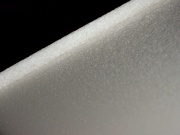Difference between revisions of "Closed cell foam"
Jump to navigation
Jump to search
m (Text replace - "== Authority ==" to "== Sources Checked for Data in Record ==") |
|||
| Line 1: | Line 1: | ||
[[File:closedcellpolyfoam.jpg|thumb|Closed cell polyethylene foam]] | [[File:closedcellpolyfoam.jpg|thumb|Closed cell polyethylene foam]] | ||
== Description == | == Description == | ||
| − | + | [[File:closedcellpolyfoam2.jpg|thumb|Closed cell polyethylene foam]] | |
A dense, durable [[foam]]. Closed cell foams have unconnected air cells that are formed by incorporating gas bubbles into the structure of the foam. This can be done mechanically by mixing in the bubbles or a low-boiling [[solvent]] into the [[polymer]] prior to curing, or chemically by adding a blowing agent that evolves [[gas]]. | A dense, durable [[foam]]. Closed cell foams have unconnected air cells that are formed by incorporating gas bubbles into the structure of the foam. This can be done mechanically by mixing in the bubbles or a low-boiling [[solvent]] into the [[polymer]] prior to curing, or chemically by adding a blowing agent that evolves [[gas]]. | ||
| − | == | + | ==Resources and Citations== |
| − | |||
| − | |||
| − | |||
| − | |||
| − | |||
| − | |||
| − | |||
* Pam Hatchfield, ''Pollutants in the Museum Environment'', Archetype Press, London, 2002 | * Pam Hatchfield, ''Pollutants in the Museum Environment'', Archetype Press, London, 2002 | ||
Revision as of 11:06, 30 May 2022
Description
A dense, durable Foam. Closed cell foams have unconnected air cells that are formed by incorporating gas bubbles into the structure of the foam. This can be done mechanically by mixing in the bubbles or a low-boiling Solvent into the Polymer prior to curing, or chemically by adding a blowing agent that evolves Gas.
Resources and Citations
- Pam Hatchfield, Pollutants in the Museum Environment, Archetype Press, London, 2002

